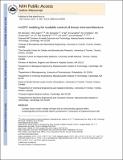InVERT molding for scalable control of tissue microarchitecture
Author(s)
Ungrin, M. D.; Chaturvedi, R. R.; Zandstra, P. W.; Chen, C. S.; Stevens, Kelly R.; Ng, Shengyong; Christine, Kathleen; Li, Cheri Yingjie; Carvalho, Brian; Schwartz, Robert E.; Bhatia, Sangeeta N; ... Show more Show less
DownloadBhatia_InVERT molding.pdf (4.747Mb)
PUBLISHER_POLICY
Publisher Policy
Article is made available in accordance with the publisher's policy and may be subject to US copyright law. Please refer to the publisher's site for terms of use.
Terms of use
Metadata
Show full item recordAbstract
Complex tissues contain multiple cell types that are hierarchically organized within morphologically and functionally distinct compartments. Construction of engineered tissues with optimized tissue architecture has been limited by tissue fabrication techniques, which do not enable versatile microscale organization of multiple cell types in tissues of size adequate for physiological studies and tissue therapies. Here we present an ‘Intaglio-Void/Embed-Relief Topographic molding’ method for microscale organization of many cell types, including induced pluripotent stem cell-derived progeny, within a variety of synthetic and natural extracellular matrices and across tissues of sizes appropriate for in vitro, pre-clinical, and clinical studies. We demonstrate that compartmental placement of non-parenchymal cells relative to primary or induced pluripotent stem cell-derived hepatocytes, compartment microstructure, and cellular composition modulate hepatic functions. Configurations found to sustain physiological function in vitro also result in survival and function in mice for at least 4 weeks, demonstrating the importance of architectural optimization before implantation.
Date issued
2013-05Department
Massachusetts Institute of Technology. Institute for Medical Engineering & Science; Harvard University--MIT Division of Health Sciences and Technology; Massachusetts Institute of Technology. Department of Biological Engineering; Massachusetts Institute of Technology. Department of Chemical Engineering; Massachusetts Institute of Technology. Department of Electrical Engineering and Computer Science; Koch Institute for Integrative Cancer Research at MITJournal
Nature Communications
Publisher
Nature Publishing Group
Citation
Stevens, K. R., M. D. Ungrin, R. E. Schwartz, S. Ng, B. Carvalho, K. S. Christine, R. R. Chaturvedi, et al. “InVERT Molding for Scalable Control of Tissue Microarchitecture.” Nature Communications 4 (May 14, 2013): 1847.
Version: Author's final manuscript
ISSN
2041-1723